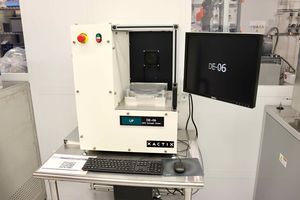Difference between revisions of "SPTS/Xactix XeF2 Isotropic Etcher"
m (Changed protection level for "SPTS/Xactix XeF2 Isotropic Etcher" ([Edit=Allow only autoconfirmed users] (indefinite) [Move=Allow only autoconfirmed users] (indefinite))) |
|||
| (5 intermediate revisions by 2 users not shown) | |||
| Line 7: | Line 7: | ||
| imagecaption = | | imagecaption = | ||
| Instrument_Type = Etch | | Instrument_Type = Etch | ||
| − | | Staff_Manager = | + | | Staff_Manager = [[Lucas Barreto | Lucas Barreto]] |
| Lab_Location = Bay 2 | | Lab_Location = Bay 2 | ||
| Tool_Manufacturer = SPTS | | Tool_Manufacturer = SPTS | ||
| Tool_Model = Xactix | | Tool_Model = Xactix | ||
| − | | | + | | NEMO_Designation = DE-06 |
| − | | Lab_Phone = | + | | Lab_Phone = 215-898-9748 |
| SOP Link = [https://repository.upenn.edu/scn_sop/16/ SOP] | | SOP Link = [https://repository.upenn.edu/scn_sop/16/ SOP] | ||
}} | }} | ||
| Line 29: | Line 29: | ||
===== SOPs & Troubleshooting ===== | ===== SOPs & Troubleshooting ===== | ||
| − | + | <pdf height="800"> File:DE06_SOP_v03.pdf</pdf> | |
Latest revision as of 14:16, 31 March 2025
 |
|
| Tool Name | SPTS/Xactix XeF2 Isotropic Etcher |
|---|---|
| Instrument Type | Etch |
| Staff Manager | Lucas Barreto |
| Lab Location | Bay 2 |
| Tool Manufacturer | SPTS |
| Tool Model | Xactix |
| NEMO Designation | DE-06 |
| Lab Phone | 215-898-9748 |
| SOP Link | SOP |
Description
XeF2 etch is a gas/chemistry isotropic etch that removes materials by chemical reaction from all directions. This method is ideal for etching Si. XeF2 crystals sublimate at room temperature with vapor pressure of ~ 3 - 4 Torr. The gas is introduced inside an expansion chamber and into the etch chamber. Given the reaction-based nature of the process, etch rate depends on the availability of gas on the etch surface, hence the rate is strongly dependent on the surface area available to etch, as well as placement of the samples inside the chamber. Given a constant gas pressure, the higher the surface area, the lower the etch rate. Nitrogen gas can be introduced in the chamber to increase selectivity and reduce surface roughness.
The gas does not etch photoresist, though it will be difficult to strip the resist after long etches.
Applications
- Isotropic etching of Si
Resources
SOPs & Troubleshooting